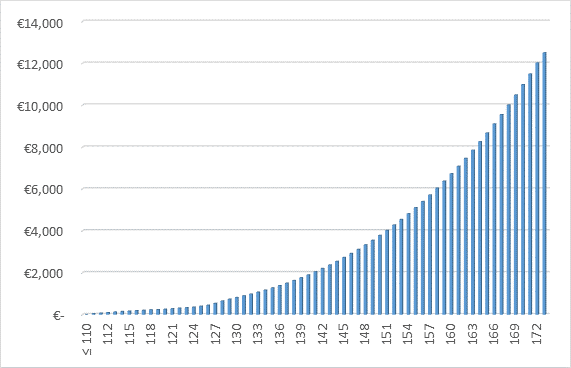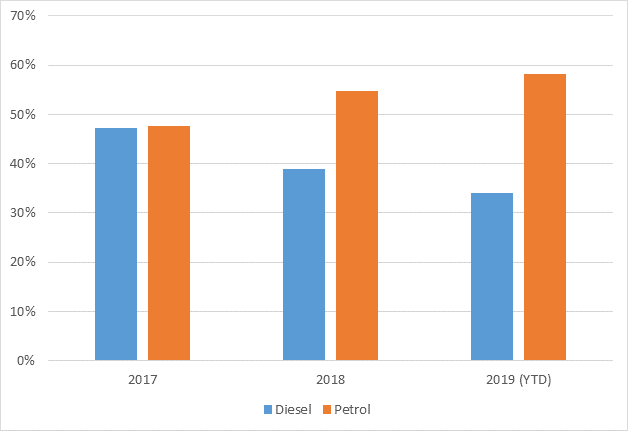2020 tax changes to impact residual values in France
28 November 2019

28 November 2019
Neil King
From 1 January 2020, France is lowering the CO2 emissions threshold over which new cars are subjected to a ′malus’ (penalty) to 110g/km. This is 7g/km lower than the existing threshold of 117g/km (introduced on 1 January 2019), which itself was already reduced from the 127g/km threshold that came into effect in January 2018.
Tax penalty (malus) by CO2 emissions from 1 January 2020
 Source: droit-finances.com
To further confuse matters, the new penalties in force from January will still be based on NEDC-correlated values but, from 1 June 2020, they will be based on WLTP figures – and this is likely to be brought forward to 1 March 2020. Under this new WLTP-based system, all cars with CO2 emissions of 138g/km or more will be subject to tax penalties. The amount payable rises from €50 for a car with 138g/km to €12,500 for all cars with emissions over 200g/km.
The change in the ′malus’ threshold from CO2 emissions of 110g/km in NEDC-correlated figures to 138g/km in WLTP figures equates to WLTP figures being 25% higher. This aligns with Autovista Group calculations made back in March 2018 that WLTP emissions figures are 25% higher under WLTP testing.
As far as company-car taxation is concerned, the new scheme from January 2020 will continue to use NEDC-correlated emission figures but this will not change to WLTP values as is the case for the bonus-malus system. Furthermore, the bonus for electric vehicles will be halved for fleets whereas it will remain at €6,000 for private buyers, although cars costing over €45,000 will no longer be entitled to the bonus.
Diesel defection
The switch from petrol to diesel cars in France, in the wake of the Dieselgate scandal, is expected to stabilise in the coming months and the number of diesel used cars should begin to decrease.
Registrations of petrol and diesel cars, market share, France, 2017-2019 (year-to-date)
Source: droit-finances.com
To further confuse matters, the new penalties in force from January will still be based on NEDC-correlated values but, from 1 June 2020, they will be based on WLTP figures – and this is likely to be brought forward to 1 March 2020. Under this new WLTP-based system, all cars with CO2 emissions of 138g/km or more will be subject to tax penalties. The amount payable rises from €50 for a car with 138g/km to €12,500 for all cars with emissions over 200g/km.
The change in the ′malus’ threshold from CO2 emissions of 110g/km in NEDC-correlated figures to 138g/km in WLTP figures equates to WLTP figures being 25% higher. This aligns with Autovista Group calculations made back in March 2018 that WLTP emissions figures are 25% higher under WLTP testing.
As far as company-car taxation is concerned, the new scheme from January 2020 will continue to use NEDC-correlated emission figures but this will not change to WLTP values as is the case for the bonus-malus system. Furthermore, the bonus for electric vehicles will be halved for fleets whereas it will remain at €6,000 for private buyers, although cars costing over €45,000 will no longer be entitled to the bonus.
Diesel defection
The switch from petrol to diesel cars in France, in the wake of the Dieselgate scandal, is expected to stabilise in the coming months and the number of diesel used cars should begin to decrease.
Registrations of petrol and diesel cars, market share, France, 2017-2019 (year-to-date)
 Source: CCFA
Accordingly, the latest residual value (RV) outlook for diesel cars in France, in the 36 month/60,000 km scenario, has been upgraded to a decline of 1.0% in 2020 and 2021 – from -1.5% previously.
However, the new tax legislation from January 2020 will favour diesel cars on the new car market as they emit less CO2 than petrol cars. ′This could lead in the future to diesel residual values decreasing more than expected as supply is stronger than demand’, comments Yoann Taitz, Operations Director of Autovista Group in France.
′Regarding the evolution of petrol residual values, I am observing the fact that in some segments where a switch from diesel to petrol has occurred in recent years, RVs are decreasing for some models and stabilising for some others. Right now, although new-car buyers are oriented to petrol, especially because of anxiogenic speeches by politicians, used-car buyers are in another reality’, adds Taitz.
Despite the slowdown in the defection from diesel cars, new registrations of petrol cars will still continue to increase in the coming years but the demand for used petrol cars will stabilise. In the latest RV outlook, Taitz expects petrol RVs in the 36 month/60,000 km scenario to increase by just 1.0% in 2020 and to be flat in 2021. Petrol values will therefore continue to grow slightly, but at a slower rate than in recent years. The previous assumption was that petrol values would grow by 1.1% in 2020 and 1.0% in 2021.
EV discounting
Taitz also highlighted that some carmakers will ′have great difficulties’ in meeting the new 95g/km CO2 target in Europe that comes into force in 2021. Accordingly, he believes OEMs will push sales of electric vehicles (EVs) with high discounts, which will ′harm their RVs, especially from 2023 when considering the bigger number of EVs on the used car market.’
′Positive development is expected for plug-in hybrids, boosted by taxation incentives and new launches as well as growing general acceptance, and residual values of standard hybrids will be boosted by political considerations and rumours,’ says Taitz.
Source: CCFA
Accordingly, the latest residual value (RV) outlook for diesel cars in France, in the 36 month/60,000 km scenario, has been upgraded to a decline of 1.0% in 2020 and 2021 – from -1.5% previously.
However, the new tax legislation from January 2020 will favour diesel cars on the new car market as they emit less CO2 than petrol cars. ′This could lead in the future to diesel residual values decreasing more than expected as supply is stronger than demand’, comments Yoann Taitz, Operations Director of Autovista Group in France.
′Regarding the evolution of petrol residual values, I am observing the fact that in some segments where a switch from diesel to petrol has occurred in recent years, RVs are decreasing for some models and stabilising for some others. Right now, although new-car buyers are oriented to petrol, especially because of anxiogenic speeches by politicians, used-car buyers are in another reality’, adds Taitz.
Despite the slowdown in the defection from diesel cars, new registrations of petrol cars will still continue to increase in the coming years but the demand for used petrol cars will stabilise. In the latest RV outlook, Taitz expects petrol RVs in the 36 month/60,000 km scenario to increase by just 1.0% in 2020 and to be flat in 2021. Petrol values will therefore continue to grow slightly, but at a slower rate than in recent years. The previous assumption was that petrol values would grow by 1.1% in 2020 and 1.0% in 2021.
EV discounting
Taitz also highlighted that some carmakers will ′have great difficulties’ in meeting the new 95g/km CO2 target in Europe that comes into force in 2021. Accordingly, he believes OEMs will push sales of electric vehicles (EVs) with high discounts, which will ′harm their RVs, especially from 2023 when considering the bigger number of EVs on the used car market.’
′Positive development is expected for plug-in hybrids, boosted by taxation incentives and new launches as well as growing general acceptance, and residual values of standard hybrids will be boosted by political considerations and rumours,’ says Taitz.
 Source: droit-finances.com
To further confuse matters, the new penalties in force from January will still be based on NEDC-correlated values but, from 1 June 2020, they will be based on WLTP figures – and this is likely to be brought forward to 1 March 2020. Under this new WLTP-based system, all cars with CO2 emissions of 138g/km or more will be subject to tax penalties. The amount payable rises from €50 for a car with 138g/km to €12,500 for all cars with emissions over 200g/km.
The change in the ′malus’ threshold from CO2 emissions of 110g/km in NEDC-correlated figures to 138g/km in WLTP figures equates to WLTP figures being 25% higher. This aligns with Autovista Group calculations made back in March 2018 that WLTP emissions figures are 25% higher under WLTP testing.
As far as company-car taxation is concerned, the new scheme from January 2020 will continue to use NEDC-correlated emission figures but this will not change to WLTP values as is the case for the bonus-malus system. Furthermore, the bonus for electric vehicles will be halved for fleets whereas it will remain at €6,000 for private buyers, although cars costing over €45,000 will no longer be entitled to the bonus.
Diesel defection
The switch from petrol to diesel cars in France, in the wake of the Dieselgate scandal, is expected to stabilise in the coming months and the number of diesel used cars should begin to decrease.
Registrations of petrol and diesel cars, market share, France, 2017-2019 (year-to-date)
Source: droit-finances.com
To further confuse matters, the new penalties in force from January will still be based on NEDC-correlated values but, from 1 June 2020, they will be based on WLTP figures – and this is likely to be brought forward to 1 March 2020. Under this new WLTP-based system, all cars with CO2 emissions of 138g/km or more will be subject to tax penalties. The amount payable rises from €50 for a car with 138g/km to €12,500 for all cars with emissions over 200g/km.
The change in the ′malus’ threshold from CO2 emissions of 110g/km in NEDC-correlated figures to 138g/km in WLTP figures equates to WLTP figures being 25% higher. This aligns with Autovista Group calculations made back in March 2018 that WLTP emissions figures are 25% higher under WLTP testing.
As far as company-car taxation is concerned, the new scheme from January 2020 will continue to use NEDC-correlated emission figures but this will not change to WLTP values as is the case for the bonus-malus system. Furthermore, the bonus for electric vehicles will be halved for fleets whereas it will remain at €6,000 for private buyers, although cars costing over €45,000 will no longer be entitled to the bonus.
Diesel defection
The switch from petrol to diesel cars in France, in the wake of the Dieselgate scandal, is expected to stabilise in the coming months and the number of diesel used cars should begin to decrease.
Registrations of petrol and diesel cars, market share, France, 2017-2019 (year-to-date)
 Source: CCFA
Accordingly, the latest residual value (RV) outlook for diesel cars in France, in the 36 month/60,000 km scenario, has been upgraded to a decline of 1.0% in 2020 and 2021 – from -1.5% previously.
However, the new tax legislation from January 2020 will favour diesel cars on the new car market as they emit less CO2 than petrol cars. ′This could lead in the future to diesel residual values decreasing more than expected as supply is stronger than demand’, comments Yoann Taitz, Operations Director of Autovista Group in France.
′Regarding the evolution of petrol residual values, I am observing the fact that in some segments where a switch from diesel to petrol has occurred in recent years, RVs are decreasing for some models and stabilising for some others. Right now, although new-car buyers are oriented to petrol, especially because of anxiogenic speeches by politicians, used-car buyers are in another reality’, adds Taitz.
Despite the slowdown in the defection from diesel cars, new registrations of petrol cars will still continue to increase in the coming years but the demand for used petrol cars will stabilise. In the latest RV outlook, Taitz expects petrol RVs in the 36 month/60,000 km scenario to increase by just 1.0% in 2020 and to be flat in 2021. Petrol values will therefore continue to grow slightly, but at a slower rate than in recent years. The previous assumption was that petrol values would grow by 1.1% in 2020 and 1.0% in 2021.
EV discounting
Taitz also highlighted that some carmakers will ′have great difficulties’ in meeting the new 95g/km CO2 target in Europe that comes into force in 2021. Accordingly, he believes OEMs will push sales of electric vehicles (EVs) with high discounts, which will ′harm their RVs, especially from 2023 when considering the bigger number of EVs on the used car market.’
′Positive development is expected for plug-in hybrids, boosted by taxation incentives and new launches as well as growing general acceptance, and residual values of standard hybrids will be boosted by political considerations and rumours,’ says Taitz.
Source: CCFA
Accordingly, the latest residual value (RV) outlook for diesel cars in France, in the 36 month/60,000 km scenario, has been upgraded to a decline of 1.0% in 2020 and 2021 – from -1.5% previously.
However, the new tax legislation from January 2020 will favour diesel cars on the new car market as they emit less CO2 than petrol cars. ′This could lead in the future to diesel residual values decreasing more than expected as supply is stronger than demand’, comments Yoann Taitz, Operations Director of Autovista Group in France.
′Regarding the evolution of petrol residual values, I am observing the fact that in some segments where a switch from diesel to petrol has occurred in recent years, RVs are decreasing for some models and stabilising for some others. Right now, although new-car buyers are oriented to petrol, especially because of anxiogenic speeches by politicians, used-car buyers are in another reality’, adds Taitz.
Despite the slowdown in the defection from diesel cars, new registrations of petrol cars will still continue to increase in the coming years but the demand for used petrol cars will stabilise. In the latest RV outlook, Taitz expects petrol RVs in the 36 month/60,000 km scenario to increase by just 1.0% in 2020 and to be flat in 2021. Petrol values will therefore continue to grow slightly, but at a slower rate than in recent years. The previous assumption was that petrol values would grow by 1.1% in 2020 and 1.0% in 2021.
EV discounting
Taitz also highlighted that some carmakers will ′have great difficulties’ in meeting the new 95g/km CO2 target in Europe that comes into force in 2021. Accordingly, he believes OEMs will push sales of electric vehicles (EVs) with high discounts, which will ′harm their RVs, especially from 2023 when considering the bigger number of EVs on the used car market.’
′Positive development is expected for plug-in hybrids, boosted by taxation incentives and new launches as well as growing general acceptance, and residual values of standard hybrids will be boosted by political considerations and rumours,’ says Taitz.